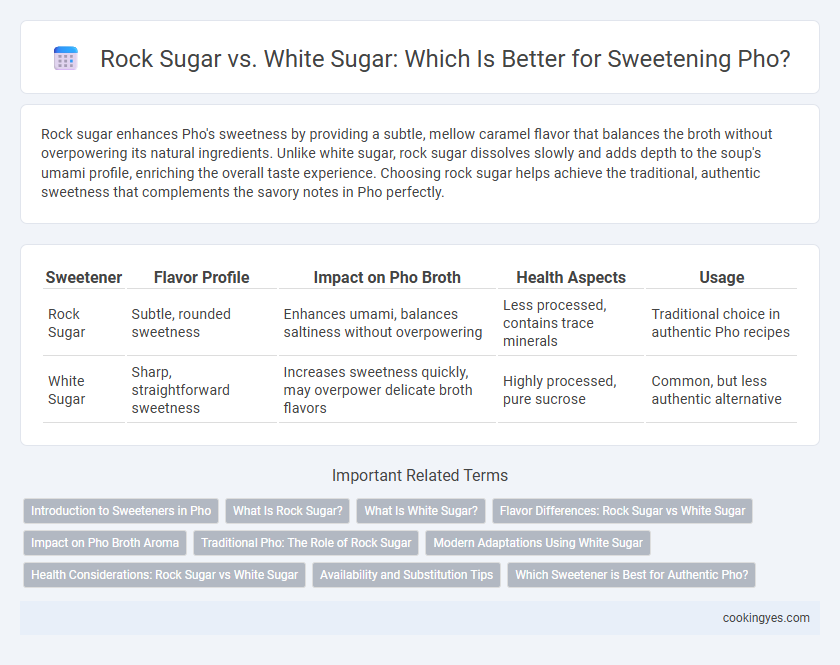Rock sugar enhances Pho's sweetness by providing a subtle, mellow caramel flavor that balances the broth without overpowering its natural ingredients. Unlike white sugar, rock sugar dissolves slowly and adds depth to the soup's umami profile, enriching the overall taste experience. Choosing rock sugar helps achieve the traditional, authentic sweetness that complements the savory notes in Pho perfectly.
Table of Comparison
| Sweetener | Flavor Profile | Impact on Pho Broth | Health Aspects | Usage |
|---|---|---|---|---|
| Rock Sugar | Subtle, rounded sweetness | Enhances umami, balances saltiness without overpowering | Less processed, contains trace minerals | Traditional choice in authentic Pho recipes |
| White Sugar | Sharp, straightforward sweetness | Increases sweetness quickly, may overpower delicate broth flavors | Highly processed, pure sucrose | Common, but less authentic alternative |
Introduction to Sweeteners in Pho
Rock sugar, also known as crystalline sugar, is preferred in Pho broth for its slow-dissolving properties and subtle sweetness that enhances the umami flavors of the beef or chicken stock. White sugar, typically granulated, dissolves quickly and imparts a sharper, more pronounced sweetness that can overpower the delicate balance of spices like star anise and cinnamon. Using rock sugar contributes to a smoother, more authentic Pho broth with a nuanced flavor profile prized in traditional Vietnamese cuisine.
What Is Rock Sugar?
Rock sugar, also known as rock candy, is crystallized sugar formed from a supersaturated solution, commonly used in Pho broth to provide a subtle, rounded sweetness without overpowering the savory flavors. Unlike white sugar, which dissolves quickly and offers a sharp sweetness, rock sugar melts slowly during cooking, enhancing the broth's depth and balance. This traditional ingredient is favored in Vietnamese Pho for its ability to harmonize the complex spices and beef flavors in the soup.
What Is White Sugar?
White sugar, chemically known as sucrose, is a refined sweetener derived primarily from sugarcane or sugar beets, characterized by its granular texture and pure white color. It is highly soluble in liquids, making it a common choice for adding sweetness to Pho broth, where it enhances the depth of flavor without altering the clarity or aroma of the soup. Unlike rock sugar, white sugar dissolves more quickly and provides immediate sweetness, but it lacks the subtle caramel notes that rock sugar imparts to traditional Pho recipes.
Flavor Differences: Rock Sugar vs White Sugar
Rock sugar imparts a subtle, mellow sweetness to pho broth, enhancing its umami and balancing savory notes without overpowering the dish. White sugar offers a sharper, more immediate sweetness that can sometimes mask delicate flavors in the broth. Choosing rock sugar preserves the complex flavor profile essential for authentic pho, while white sugar may result in a less nuanced taste experience.
Impact on Pho Broth Aroma
Rock sugar enhances Pho broth aroma by imparting a subtle, clean sweetness that balances savory and umami flavors without overpowering them, resulting in a more authentic and harmonious taste. White sugar, while sweeter, can sometimes introduce a sharper, less nuanced sweetness that may mask the delicate spice and herbal notes in the broth. Using rock sugar helps preserve the aromatic integrity of Pho, contributing to its distinctive fragrant and savory profile.
Traditional Pho: The Role of Rock Sugar
Traditional pho relies on rock sugar to achieve its signature balanced sweetness, enhancing the broth's depth without overpowering the savory flavors. Rock sugar dissolves slowly, allowing for a gradual infusion of subtle sweetness that complements the aromatic spices like star anise and cinnamon. Unlike white sugar, rock sugar preserves the broth's clarity and contributes to a richer, more nuanced umami profile essential in authentic Vietnamese pho.
Modern Adaptations Using White Sugar
Modern adaptations of Pho increasingly use white sugar instead of traditional rock sugar to achieve a smoother and more evenly distributed sweetness. White sugar dissolves faster during broth preparation, enhancing the balance of savory and sweet flavors without altering the authentic taste profile. This shift caters to convenience and consistency while maintaining the rich umami character characteristic of classic Pho broth.
Health Considerations: Rock Sugar vs White Sugar
Rock sugar is often preferred in Pho broth for its slower dissolution and milder sweetness, which may result in a lower glycemic impact compared to white sugar. White sugar, being more refined, causes rapid blood sugar spikes and lacks the trace minerals found in rock sugar. Choosing rock sugar can offer a subtle, balanced sweetness while potentially supporting better blood sugar management and overall health.
Availability and Substitution Tips
Rock sugar is commonly used in Pho for its subtle sweetness and slow dissolution, enhancing the broth's depth, but it may be harder to find in some regions compared to white sugar. White sugar, widely available in most grocery stores, can be used as an effective substitute, though it imparts a sharper sweetness that may slightly alter the broth's flavor profile. To mimic rock sugar's effect, dissolve white sugar gradually over low heat and balance with a small amount of palm sugar if accessible.
Which Sweetener is Best for Authentic Pho?
Rock sugar is preferred over white sugar for pho due to its mild, natural sweetness and ability to balance the broth without overpowering other flavors. It dissolves slowly during simmering, enhancing the broth's depth and clarity without creating a sharp or artificial sweetness common with white sugar. Using rock sugar preserves the traditional, authentic taste of pho, making it the best sweetener choice for genuine Vietnamese noodle soup.
Rock sugar vs white sugar for Pho sweetness Infographic

 cookingyes.com
cookingyes.com